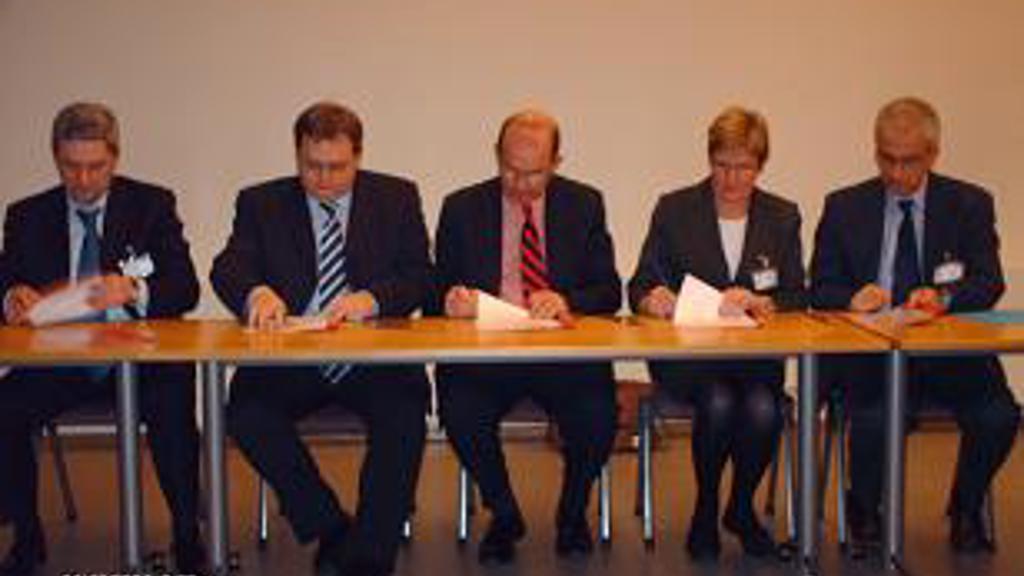Minister Kalsø welcomes international agreement on Atlanto-Scandian herring

The Minster of Fisheries of the Faroes, Bjørn Kalsø, has welcomed the recently concluded agreement on the Atlanto-Scandian herring stock.
“The agreement for 2007 is a long-overdue return to responsible international cooperation and control of the herring fishery in our region, which is of vital importance to the Faroes,” said Mr Kalsø
Minister Kalsø welcomes international agreement on Atlanto-Scandian herring
The Minster of Fisheries of the Faroes, Bjørn Kalsø, has welcomed the recently concluded agreement on the Atlanto-Scandian herring stock.
“The agreement for 2007 is a long-overdue return to responsible international cooperation and control of the herring fishery in our region, which is of vital importance to the Faroes,” said Mr Kalsø
After three rounds of negotiations in Oslo between the Faroes, the European Community, Iceland, Norway, and the Russian Federation, agreement was finally reached on 18 January on a multi-lateral arrangement for the management of the Atlanto-Scandian herring stock in the Northeast Atlantic. It is 4 years since such an arrangement was last in place
The coastal states have agreed to set a total allowable catch for 2007 of 1.28 million tons, of which the Faroese share is 66,048 tons, equivalent to 5.16% of the agreed allocation. The shares of the other Parties are 6.51% for the European Community, 14.51% for Iceland, 61% for Norway and 12.82% for the Russian Federation.
“The absence of an agreed international regulation since 2002 was creating a real risk of unsustainable expansion of the fishery and unregulated fisheries in international waters. The Faroese economy is dependent on sustainable fisheries. For us, international cooperation and control on shared stocks is crucial,” said Mr Kalsø.
“With agreed international measures back in place, I hope we can now ensure the further development of the herring stock and the fishery in our area.”
The increased occurrence of Atlanto-Scandian herring in Faroese and international waters in recent years is a clear indication of the robust state of the stock. It could also be a sign that the herring may once again in the future resume its traditional migration westward to the area between the Faroes and Iceland in the winter season, which characterised the stock in the 1950s and 60’s.
The new agreement has its basis in the five-Party management arrangement which was first concluded in 1996, and renewed on an annual basis until 2003. There have been some minor adjustments to respective shares in the allocation in order to accommodate Norway’s claims as the major stakeholder. But the new arrangement also provides improved balance in bilateral access arrangements for Faroese vessels to fish in Norwegian waters.
In addition the arrangement renews commitment to a long-term management plan for the stock, setting precautionary parameters for over all fishing mortality designed to maintain the spawning stock biomass at optimum levels in the long term.
Fisheries for the large pelagic stocks of herring, blue whiting and mackerel in the Northeast Atlantic are a major part of total Faroese fisheries, both in terms of total catches as well as income. A total of 11 Faroese vessels (purse seiners and pelagic trawlers) operate year-round in different areas and seasons according to where the fishery is most economical. This helps ensure optimum sustainable catches and a steady supply of fish. Onshore freezing facilities, factory and freezer trawlers, as well as a modern fish meal plant in the Faroes provide for the production of whole and filleted products for consumers as well as high quality fish meal for the aquaculture and agriculture sectors in international markets.
Herring agreement signed in Oslo, 18 January 2007. From left: Mikhail Mamonov, Russian Federation; Stefán Ásmundsson, Iceland; Per Ludvig Magnus, Norway; Kate Sanderson, Faroes; and Constantin Alexandrou, European Community.
